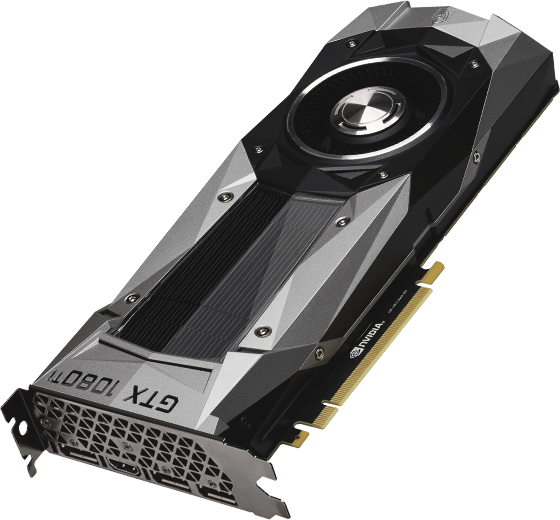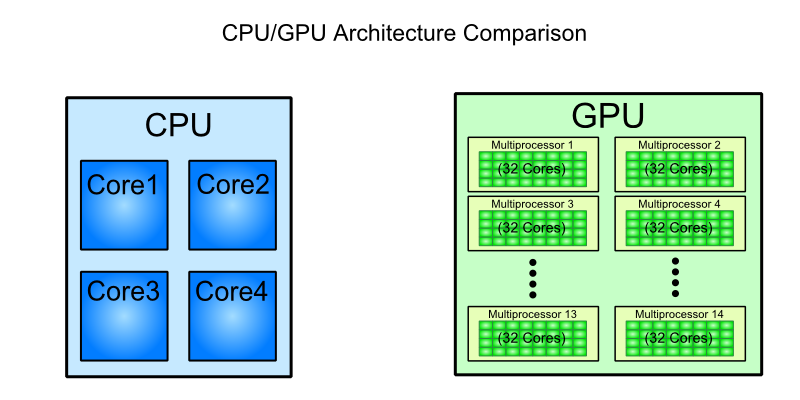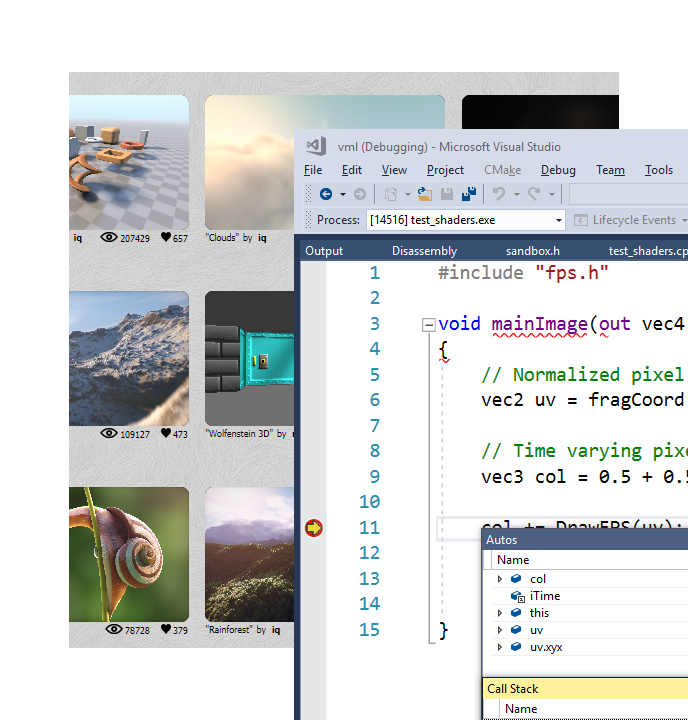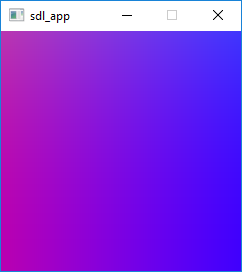/*
* red mesh red shaded mesh
*/
surface basic() { surface simple(color myOpacity = 1) {
Ci = (1.0, 0.0, 0.0); color myColor = (1.0, 0.0, 0.0);
Oi = 1; normal Nn = normalize(N);
} Ci = myColor * myOpacity * diff;
Oi = myOpacity;
}Rapid Prototyping of Graphics Shaders in Modern C++
Valentin Galea
More than 10 years in mobile, indie and AAA games
Agenda
Intro and Motivation
Shading Languages
C++
Showcase
Shaders
A computer program that is used to do shading
Depicting depth perception in 3D models or illustrations by varying levels of darkness
A computer program that tells the computer how to draw something
Shaders on Modern GPU’s

- Computer graphics / Images
- Highly parallel computing
- Mining for cryptocurrency :)
Why on GPU

Types of Shaders

Vertex
Geometry
Tessellation
Fragment(Pixel)
-----
Compute
Pixel/Fragment Shader

| We will concentrate on (procedurally generated) image-only shaders |
Motivation
I wanted to create real-time effects like…
on more limited devices…
|
|
…because of long commutes!
also because GPU driver render bugs
| taken on desktop PC / Nvidia GTX 1060 |
Giveaway: VML
|
|
Demo: GPU via Shadertoy.com
Demo: CPU via GCC 8.0 (mobile)
Shading Languages
Pixar RenderMan Language
Shading Languages History
For real-time rendering:
Early: ARB assembly, Cg
OpenGL shading language (GLSL)
DirectX High-Level Shader Language (HLSL)
PlayStation Shader Language (similar to HLSL)
GLSL vs HLSL
varying vec3 N;
varying vec3 v;
void main(void)
{
vec3 L = normalize(gl_LightSource[0].position.xyz - v);
vec4 Idiff = gl_FrontLightProduct[0].diffuse * max(dot(N,L), 0);
Idiff = clamp(Idiff, 0.0, 1.0);
gl_FragColor = Idiff;
}float4 main(
float3 Light: TEXCOORD0,
float3 Norm : TEXCOORD1) : COLOR
{
float4 diffuse = { 1.0, 0.0, 0.0, 1.0 };
float4 ambient = { 0.1, 0.0, 0.0, 1.0 };
return ambient + diffuse * saturate(dot(Light, Norm));
}Languages: Types
GLSL | HLSL | |
Scalar |
| |
Vector |
|
|
Matrix |
|
|
…textures, samplers, precision modifiers etc | ||
Languages: Declarations
GLSL | HLSL | C++ |
C-style types and arrays | ||
C-style | ||
|
| both |
Languages: Func Args
GLSL and HLSL | C++ |
|
|
|
|
|
|
| |
Vectors and Matrices
// vectors are generic
vec2 texcoord1, texcoord2;
vec3 position;
vec4 myRGBA;
ivec2 textureLookup;
bvec3 less;// matrices are floating point only
mat2 mat2D;
mat3 optMatrix;
mat4 view, projection;Vector Swizzle
Syntactic sugar for easy referring to components (or combination of)
{ x, y, z, w } | to represent points or normals |
{ r, g, b, a } | to refer to colors ( |
{ s, t, p, q } | texture coordinates |
Vector Swizzle - Examples
vec4 v4;
v4.rgba; // is a vec4 and the same as just using v4,
v4.rgb; // is a vec3,
v4.b; // is a float,
v4.xy; // is a vec2,vec4 pos = vec4(1.0, 2.0, 3.0, 4.0);
vec4 swiz= pos.wzyx; // swiz = (4.0, 3.0, 2.0, 1.0)
vec4 dup = vec4(pos.xx, pos.yy);pos.xw = vec2(5.0, 6.0); // pos = (5.0, 2.0, 3.0, 6.0)
pos.xx = vec2(3.0, 4.0); // illegal - 'x' used twiceVector Swizzle - Motivation
vec3 calcNormal( in vec3 pos )
{
vec2 e = vec2(1.0, -1.0) * 0.0005;
return normalize(
e.xyy * map( pos + e.xyy ).x +
e.yyx * map( pos + e.yyx ).x +
e.yxy * map( pos + e.yxy ).x +
e.xxx * map( pos + e.xxx ).x );
}Operators
syntax | equivalent |
| |
| |
"Standard Library"
Math |
|
Common |
|
Utility |
|
Geometry |
|
Specific texture and image sampling … | |
Shading Languages Future
Basically C++ (usually via LLVM)
Metal Shading Language (C++14, Apple)
only on iOS devices
CUDA Heterogeneous Computing (C++11, NVidia)
only for computing, not graphics
HLSL 6.x (C++98’ish, Microsoft)
not released yet
Let’s see how C++ can help out, NOW!
The Plan
Pick a shading language and twist C++ to accept it as source code!
BONUS: use the preprocessor for transcription back to the original language(s)!
The Plan (cont.)
obligatory preprocessor layer
vector (linear algebra) types
swizzle support
matrix types
operators
"standard library" utility/math functions
Place Your Bets
We will chose GLSL as it’s used on desktop, web and mobile
| only a subset of it - concentrate on procedural graphics thus minimize/eliminate inputs (textures, vertex data, etc) |
Design of vector<>
template<typename T, size_t N> struct vector : public vector_base<T, N> {vector(); explicit vector(scalar_type s); template<typename... Args> explicit vector(Args... args);scalar_type& operator[](size_t i); scalar_type& operator[](size_t i); vector_type& operator +=(scalar_type s); vector_type& operator +=(const vector_type& v); (etc)
vector<> ctor - basic
vector()
{
static_for<0, N>()([this](size_t i) {
data[i] = 0;
});
}explicit vector(scalar_type s)
{
static_for<0, N>()([s, this](size_t i) {
data[i] = s;
});
}static_for utility
template<size_t Begin, size_t End> struct static_for { template<class Func> constexpr void operator ()(Func&& f) { f(Begin); static_for<Begin + 1, End>()(std::forward<Func>(f)); } };template<size_t N> struct static_for<N, N> { template<class Func> constexpr void operator ()(Func&&) { /* terminate */ } };
vector<> ctor - advanced
template<typename A0, typename... Args,class = typename std::enable_if< ((sizeof... (Args) >= 1) || ((sizeof... (Args) == 0) && !std::is_scalar_v<A0>)) >::type>explicit vector(A0&& a0, Args&&... args) { static_recurse<0>( std::forward<A0>(a0), std::forward<Args>(args)... ); }
vector<> ctor - advanced (2)
template<size_t I, typename Arg0, typename... Args> void static_recurse(Arg0&& a0, Args&&... args) { construct_at_index<I>(std::forward<Arg0>(a0)); static_recurse<I + get_size<Arg0>()>( std::forward<Args>(args)... ); }template<size_t I> void static_recurse() { /* terminate */ }
vector<> ctor - advanced (3)
template<size_t i> void construct_at_index(scalar_type arg) { data[i] = arg; }template<size_t i, typename Other, size_t Other_N> void construct_at_index(vector<Other, Other_N>&& arg) { constexpr auto count = std::min(i + Other_N, num_components); static_for<i, count>()([&](size_t j) { data[j] = arg.data[j - i]; }); }
vector<> ctor in action
using vec2 = vector<int, 2>;
using vec3 = vector<int, 3>;
vec3 v = vec3(98, vec2(99, 100));
// ^ ^
// | |
// `-- scalar construct gets called
// |
// `---- sub-vector construct gets called
// and then recursively againGodbolt
int main()
{
float a, b;
scanf("%f %f", &a, &b);
auto v = vec3(1.f, vec2(a, b));
printf("%f %f", v.x, v.y);
}-std=c++17 -Wall -O2 (source)
Godbolt (cont.)
| clang (5.x/6.x) | gcc (7.x/8.x) | msvc (2017) |
|---|---|---|
| | |
Problem: Debug
void static_for<0ul, 3ul>::operator()<vector<float, 3ul>...
push rbp
mov rbp, rsp
sub rsp, 32
mov QWORD PTR [rbp-24], rdi
mov QWORD PTR [rbp-32], rsi
mov rax, QWORD PTR [rbp-32]
mov esi, 0
mov rdi, rax
call vector<float, 3ul>::vector(float)::{lambda(unsigned...
mov rax, QWORD PTR [rbp-32]
mov rdi, rax
call vector<float, 3ul>::vector(float)::{lambda(unsigned...
mov rdx, rax
lea rax, [rbp-1]
mov rsi, rdx
mov rdi, rax
call void static_for<1ul, 3ul>::operator()<vector...
nop
leave
retSolution: C++17 Fold Expressions
(E op …) → (E1 op (… op (EN-1 op EN)))
| ||
clang 3.6+ | gcc 6+ | MSVC 2017 15.5+ |
Improved design of vector<>
template<typename T, size_t... Ns> struct vector : public vector_base<T, Ns...> {vector() { ((data[Ns] = 0), ...); }explicit vector(scalar_type s) { ((data[Ns] = s), ...); } template<typename A0, typename... Args> explicit vector (etc)
Folding Expressions in action
declaration | instantiation |
| |
Improved vector<> ctor
template<typename A0, typename... Args>
explicit vector(A0&& a0, Args&&... args)
{
size_t i = 0; // advances as we consume args
// consume the first one
construct_at_index(i, std::forward<A0>(a0));
// consume the rest, if any
(construct_at_index(i, std::forward<Args>(args)), ...);
}Swizzling
vector_base naive impl
template<typename T>
struct vector_base<T, 2>
{
union
{
T data[2];
struct { T x, y; };
struct { T s, t; };
struct { T u, v; };
}
};vector_base naive impl (2)
template<typename T>
struct vector_base<T, 3>
{
union
{
T data[3];
struct { T x, y, z; };
struct { T r, g, b; };
struct { T s, t, p; };
}
};vector_base naive impl (3)
template<typename T>
struct vector_base<T, 4>
{
union
{
T data[4];
struct { T x, y, z, w; };
struct { T r, g, b, a; };
struct { T s, t, p, q; };
}
};vector_base notes
both anonymous struct and union are permitted, only MSVC complains with warning |
union active member switching can be tricky [10.5] but we’ll use only trivial types with trivial assignment |
Swizzle
| We introduce an additional proxy class that allows custom access to the indices and we create all possible permutations (per GLSL/HLSL standard) |
template<class vector_type, class T, size_t N, size_t... indices>
struct swizzler
{
T data[N];
(etc)Swizzle for vector<T, 3>
union
{
T data[3];
struct {
swizzler<0>::type x;
swizzler<1>::type y;
swizzler<2>::type z;
};
struct {
swizzler<0>::type r;
swizzler<1>::type g;
swizzler<2>::type b;
};
struct {
swizzler<0>::type s;
swizzler<1>::type t;
swizzler<2>::type p;
};
...swizzle (cont.)
...
swizzler<0, 0>::type xx, rr, ss;
swizzler<0, 1>::type xy, rg, st;
swizzler<0, 2>::type xz, rb, sp;
swizzler<1, 0>::type yx, gr, ts;
swizzler<1, 1>::type yy, gg, tt;
swizzler<1, 2>::type yz, gb, tp;
swizzler<2, 0>::type zx, br, ps;
swizzler<2, 1>::type zy, bg, pt;
swizzler<2, 2>::type zz, bb, pp;
...…more swizzle
...
swizzler<0, 0, 0>::type xxx, rrr, sss;
swizzler<0, 0, 1>::type xxy, rrg, sst;
swizzler<0, 0, 2>::type xxz, rrb, ssp;
swizzler<0, 1, 0>::type xyx, rgr, sts;
swizzler<0, 1, 1>::type xyy, rgg, stt;
swizzler<0, 1, 2>::type xyz, rgb, stp;
swizzler<0, 2, 0>::type xzx, rbr, sps;
swizzler<0, 2, 1>::type xzy, rbg, spt;
swizzler<0, 2, 2>::type xzz, rbb, spp;
swizzler<1, 0, 0>::type yxx, grr, tss;
swizzler<1, 0, 1>::type yxy, grg, tst;
swizzler<1, 0, 2>::type yxz, grb, tsp;
...…even more swizzle!
...
swizzler<2, 1, 2, 0>::type zyzx, bgbr, ptps;
swizzler<2, 1, 2, 1>::type zyzy, bgbg, ptpt;
swizzler<2, 1, 2, 2>::type zyzz, bgbb, ptpp;
swizzler<2, 2, 0, 0>::type zzxx, bbrr, ppss;
swizzler<2, 2, 0, 1>::type zzxy, bbrg, ppst;
swizzler<2, 2, 0, 2>::type zzxz, bbrb, ppsp;
swizzler<2, 2, 1, 0>::type zzyx, bbgr, ppts;
swizzler<2, 2, 1, 1>::type zzyy, bbgg, pptt;
swizzler<2, 2, 1, 2>::type zzyz, bbgb, pptp;
swizzler<2, 2, 2, 0>::type zzzx, bbbr, ppps;
swizzler<2, 2, 2, 1>::type zzzy, bbbg, pppt;
swizzler<2, 2, 2, 2>::type zzzz, bbbb, pppp;
};swizzler<> design
template<
typename vector_type,
typename scalar_type,
size_t N,
size_t... indices>
struct swizzler
{
T data[N];
// N might differ from vector_type::num_components
// ex: .xxxx from vec2
(etc)swizzler<> conversions
Needs to implicitly convert/assign to its
vector<>equivalentoperator vector_type() { vector_type vec; assign_across(vec, 0, indices...); return vec; }swizzler& operator=(const vector_type& vec) { assign_across(vec, 0, indices...); return *this; }
swizzler<> design (cont.)
We use same fold expression trick
template<typename... Indices> void assign_across(vector_type& vec, size_t i, Indices ...j) const { ((vec[i++] = data[j]), ...); }template<typename... Indices> void assign_across(const vector_type& vec, size_t i, Indices ...j) { ((data[j] = vec[i++]), ...); }
swizzler<> problem
vec3 v = vec4(other.xy, other.zw);> error: no matching function for call to [...]
> template argument deduction/substitution failed: [...]Solution? Introduce another abstraction layer!
(construct_at_index(i, decay(std::forward<Args>(args))), ...);decaycalls equivalent member function (or does nothing for scalar)both
vectorandswizzlerhave one so they can interchange easily
Operators and Functions
We will need to re-create a lot of generic utility functions
Example: the dot (inner) product of two vectors
template<typename T, size_t... Ns> T dot(const vector<T, Ns...> &, const vector<T, Ns...> &);float n = dot(vec3(1, 0, 0), vec3(0, 0, 1));
| We immediately hit a big problem! |
vec3 v = vec3(1, 0, 0);
float n = dot(v.xzx, v.zyx);> 'dot': no matching overloaded function found
> could not deduce template argument| Type deduction does not consider implicit conversions! |
Possible fixes:
float n = dot<float, 0, 1, 2>(v.xzx, v.zyx);create by hand all scalar/size combinations :(
SFINAE tricks
A better fix
we place the functions in a non-deduced context: inside vector<> itself! |
template<typename T, size_t... Ns> struct vector { friend T dot(const vector& a, const vector& b) { /* inline friend found via ADL */ } (etc)
Are we done?
| No! |
- Lots of shader code uses scalar types only:
float opS(float d1, float d2) { return max(-d2, d1); } - We only provide the vector variant
friend vector max(const vector& a, const vector& b) { return vector((a.data[Ns] < b.data[Ns] ? a.data[Ns] : b.data[Ns])...); }
More trouble
- Ambiguity with literals:
smoothstep(0, 1, v.xyz); // ^ // could be `int`, `float` or `double` friend vector smoothstep(scalar_type, scalar_type, const vector&); // ^ // only templated on vector
Solution
Inspect the list of function args and deduct a vector type using std::common_type techniques
- First: need to make
vec1convert to/from scalarsstd::is_convertible<vec1, float>::value == true - Then: provide custom type traits
promote_to_vec< float >::type == vec1 promote_to_vec< vec3 >::type == vec3 promote_to_vec< decltype(vec3().xyz) >::type == vec3promote_to_vec< vec3, float >::type == vec3 promote_to_vec< vec3, float, double >::type == vec3
Solution (cont.)
- Insted of
friendfunctions arestatictemplate<template<class, size_t...> class vector, class T, size_t... struct builtin_func_lib { static vector max(const vector& a, const vector& b) (etc) - Create an all-forwarding monster function
template<class... Args> inline auto func(Args&&... args) -> decltype(decay( promote_to_vec<Args...>::type:: func(std::forward<Args>(args)...))) { return promote_to_vec<Args...>::type:: func(std::forward<Args>(args)...); }
Solution - Compromise
...
MAKE_LIB_FUNC(abs)
MAKE_LIB_FUNC(sign)
MAKE_LIB_FUNC(floor)
MAKE_LIB_FUNC(trunc)
MAKE_LIB_FUNC(ceil)
MAKE_LIB_FUNC(fract)
MAKE_LIB_FUNC(mod)
MAKE_LIB_FUNC(min)
MAKE_LIB_FUNC(max)
MAKE_LIB_FUNC(clamp)
MAKE_LIB_FUNC(mix)
MAKE_LIB_FUNC(step)
MAKE_LIB_FUNC(smoothstep)
...Solution - Demo
return max(-d2, d1);
// ||
// ||
// \/
promote_to_vec<float, float>
// ||
// ||
// \/
return vector<float, 0>::max(-d2, d1);
the matrix<> datatype
Now that we have vector<> a matrix is more straightforward
template<
typename,
template<typename, size_t...> class vector_type,
typename...
>
struct matrix;Folding helper
| two dimensional → introduce helper type for the indices |
template<size_t...>
struct indices_pack;the matrix<> datatype (cont.)
template< typename scalar_type, template<typename, size_t...> class vector_type, size_t... Columns, size_t... Rows > struct matrix<scalar_type, vector_type, indices_pack<Columns...>, indices_pack<Rows...>>{ static constexpr auto N = sizeof...(Columns); static constexpr auto M = sizeof...(Rows); using column_type = vector_type<scalar_type, Columns...>; using row_type = vector_type<scalar_type, Rows...>; column_type data[M]; (etc)
the matrix<> declaration
using vec2 = vector<float, 0, 1>;
using vec3 = vector<float, 0, 1, 2>;
using mat2 = matrix<float, vector,
indices_pack<0, 1>, indices_pack<0, 1>>;
using mat3 = matrix<float, vector,
indices_pack<0, 1, 2>, indices_pack<0, 1, 2>>;
using mat2x3 = matrix<float, vector,
indices_pack<0, 1>, indices_pack<0, 1, 2>>;the matrix<> constructors
matrix() = default; // zeroes all dataexplicit matrix(scalar_type s) // fill in diagonally { ((data[Rows][Rows] = s), ...); }template<typename... Args> explicit matrix(Args&&... args) { size_t i = 0; (construct_at_index(i, decay(std::forward<Args>(args))), ...); }
the matrix<> ops and funcs
can recycle the same binary operators as vector if written generic
except multiplication
which needs to be handled differently
for all variations of
matrix,row_type,column_type
Prior Art
| not invented here :) |
clang vector extensions
typedef float vec3 __attribute__((ext_vector_type(3)));PRO: supports full swizzling
CON: very limited in initializations
3rd party libraries
GLM
.xyz()style onlyhorrible preprocessor heavy implementation
CXXSwizzle
full spec
slow debug
Results
…but first: Crash Course into Procedural Graphics!
| Courtesy of @ReinderNijhoff https://www.shadertoy.com/view/4dSfRc |
Showcase
GPU / desktop PC
Nvidia GeForce 1060
1080p
CPU / desktop PC
minimal draw app with https://www.libsdl.org/
AMD FX 8350 8-core 4.00 GHz
Microsoft Visual C++ 2017
/O2 /Ob2 /fp:fast /fp:except-
CPU / mobile phone
C4Droid app (https://play.google.com/store/apps/details?id=com.n0n3m4.droidc)
Samsung Galaxy S7
GCC 8.0
-Ofast -march=native -funroll-loops
Hello World (CPU)
|
| |
240x240 px | 85.62 FPS | 166.77 FPS |
120x120 px | 100.27 FPS | 468.49 FPS |
Planet (CPU)
|
| |
240x240 px | 1.92 FPS | 0.83 FPS |
120x120 px | 7.30 FPS | 3.34 FPS |
Clouds (CPU)
|
| |
240x240 px | 2.54 FPS | 2.44 FPS |
120x120 px | 9.63 FPS | 9.64 FPS |
Vinyl Turntable (CPU)
|
| |
240x240 px | 8.44 FPS | 2.94 FPS |
120x120 px | 28.11 FPS | 12.82 FPS |
 @valentin_galea
@valentin_galea
Attribution
Piotr Gwiazdowski @gwiazdorrr for original inspiration and help
Shading and Renderman: Jaume Sanchez | @thespite
Motivation Shaders: Inigo Quilez https://www.shadertoy.com/view/ld3Gz2 https://www.shadertoy.com/view/ldScDh https://www.shadertoy.com/view/4ttSWf
GPU pipeline: https://open.gl/ (CC BY-SA 4.0)
All other images under "Fair Use"/"Fair Dealing"










